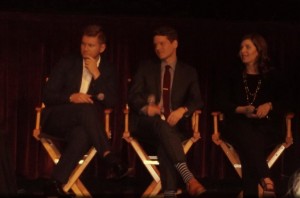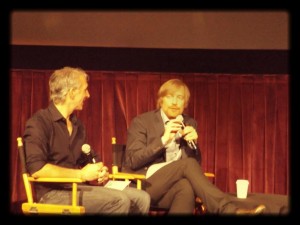Imitation GameQ&A with Morten Tyldum, Graham Moore, and Allen Leech
[Disclaimer: This Q/A does involve major spoilers. If you have not seen the movie, please DO NOT go forward, unless you want to be cheeky. In the meantime please check out our movie review. And please read on.]
The Imitation Game Q&A
AARP: Movies for Grown-ups
November 9th, 2014
In Attendance:
Scott Mantz (SM) – Curator
Graham Moore (GM)- Screenwriter
Morten Tyldum (MT)- Director
Allen Leech (AL) – Actor
Producer (unfortunately missed out on her name)
SM: THERE WERE A NUMBER OF OTHER FILM MAKERS THAT WERE CIRCLING THE PROJECT–LIKE VULTURES–.
WHEN YOU WATCH THIS MOVIE, THIS IS A STORY THAT IS FASCINATING,DEEPLY ENGAGING,
AND IT IS AROUSING, UPLIFTING AND [THERE IS] A LOT MORE HUMOR THAN I EXPECTED IN
THE MOVIE AND IT IS MOST IMPORTANTLY THE TRUE DEFINITION OF A CROWD PLEASER.
MORTEN, HOW DID THIS COME TO YOU AND HOW GREAT WAS IT TO CRAFT THESE AMAZING
FILMMAKERS TO DO YOUR PROJECT?
MT: Thank you. I just came a hold of it after editors and I was reading
a lot of scripts all of them action and superhero movies. And I had this
beautiful script in front of me and I read it and I loved it. Like many
people I was shocked and ashamed about how much that I didn’t know about
[Alan Turing’s] life. And I thought that it was insane. Why wasn’t he
taught about in school? So [I] became obsessed and it became important
and that’s what you want a film to do. You want to find a film project that
you fall in love with. And it became such an important story for me.To
me he is this outsider, I wanted to make a movie to not only attribute to
celebrate his life and his achievements, but the outsider. Alan was an outsider
he was not burdened down by normalities. So I had a meeting with Nora Ido
and Graham [Moore]. We shared thoughts about how we wanted to make this movie
None of us wanted it to be somber, we wanted the film to be funny and engaging
and warm. A film should have all of these elements.
SM: LET’S TALK ABOUT FINANCING THIS MOVIE. THIS WAS NOT “BANK ROLLED” BY A STUDIO. BUT INSTEAD SOMEONE’S SON WHO HAD DEEP POCKETS. BUT WATCHING THE MOVIE THE MOVIE THE PRODUCTION IS JUST TOP NOTCH.
Producer: We got lucky that we found a director who could stay within budget.
It actually was a studio movie for a while, but then we got the rights back to it.
And at that point because of the explosion from the Blacklist (tv show)
we did have a lot of people interested in doing the project.
SM: WHEN IT COMES TO THE PERFORMANCE OF ALAN TURING, LET’S HEAR IT FOR BENEDICT CUMBERBATCH. HOW DID HE COME ACROSS THE PROJECT? HOW WAS IT LIKE WORKING WITH HIM? WHAT IDEAS DID HE BRING TO THE CHARACTER THAT WAS JUST BEYOND THE PAGE.
MT: I’ve always wanted Benedict from the beginning. I didn’t pursue
any other actors. And luckily Benedict read the script and liked it and was
overly passionate about it. So we had a discussion and it was a call
where I tried to convince him and he tried to convince me (laughs). He
said there is something about the complexity of [Alan Turing]. Alan is
determined and strong, so [Benedict] didn’t want him to be an awkward
rendition. But at the same time he is so fragile, and socially awkward
and I wanted it to be in the core of the film. This young boy that lost so much
and knew all these secrets. Benedict read his descriptions. We talked to
his family members, who were young when they last saw him,and we actually
had a screening with 17 of his relatives in London. And it was very touching to all
of us and they were very supportive of the movie and proud. They said
it was like watching him be alive and that was a very great compliment.
SM: ALLEN, IN TERMS OF PREPARATION, I WANT TO KNOW, WHAT YOU DID IN TERMS OF THE
CHARACTER AND WHEN YOU WERE WORKING WITH BENEDICT WHAT WAS IT LIKE?
AL: We were very privileged to know each other before rehearsal. That in
itself was a great opportunity to discuss what we had researched separately
There was some information there about each character already. But when you
get together you start cross referencing about what you read in other books
and other things you’ve read. And that day [rehearsal], again, was a great day
create these characters. It was wonderful to be [on set] when everyone was there
Being together gives you a sense of security when you have a close knit group.
We really were a family doing this together.
SM: WHEN YOU ARE WATCHING THE FILM IT FEELS LIKE FAMILY. BECAUSE NO ONE ELSE
KNOWS WHAT THESE PEOPLE ARE DOING. AND NO ONE IS SUPPOSED TO. THEY WERE
ALL THAT THEY HAD. AND THERE IS THIS ONE MOMENT IN THE FILM WHERE PEOPLE
START TO GASP IT’S ABOUT TWO/THIRDS OF THE WAY INTO THE FILM WHERE THEY GO
“OH WELL WE HAVE THE CODE, LET’S GO SAVE THESE SHIPS!” AND THEN THEY ARE LIKE
“NO, WE CAN’T.” AND THE OTHER GUY IS LIKE “WELL, MY BROTHER IS ON ONE OF THOSE SHIPS.”
AND EVERYONE IN THE AUDIENCE JUST GOES “OH WOW”. AND THERE’S THIS WHOLE OTHER SIDE
ABOUT WHAT DO YOU DO?
MT: You can actually make a whole movie about what they did to keep it secret
that cracks me up. They did all these crazy things. If they found out that
a German convoy was coming they would send a spy plane over it and the Germans
would be like “oh look, there’s a spy plane, bad luck.” The Germans never found
out that [enigma] was broken. In the movie there is so much war going on and we’ve got this
there’s the planes, the submarines, the tanks. Then there this small human war going on
with the group on them. They had to go on until Midnight and it was impossible day after
day, after day until they could get the machine up.It’s just mind blowing and their
achievements as Winston Churchill said “Alan Turning did the single
most important achievement in the second world war.”
SM: THAT’S PRETTY HIGH PRAISE COMING FROM CHURCHILL. WE KNOW IN THE FILM THAT
ALAN TURING COMMITS SUICIDES THERE’S A PART IN THE SCREENPLAY WHERE THAT WAS
COVERED, BUT NOT FILMED. I WAS WONDERING WHAT WAS BEHIND THE DECISION TO
NOT INCLUDE THAT.
MT: We had a scene which ends like the movie starts with the police arriving to his house
and he’s killed himself with an apple with cyanide. There’s a rumor going around
that the apple joke is a tribute to Alan Turing and the cyanide clean up at the beginning.
Which is not true (laughs). We just wanted him to carry around an apple with him everyday.
So we come up the scene where he said goodbye to Christopher. Emotionally, I think this is the
most important part to me, saying goodbye to Christopher. I asked Benedict what he thought
of the last line [of the script and he said “I’ll see you soon, again”. So to me that [goodbye]
was more beautiful than most of them. The monologue that Keira has
at the end is what I wanted us to tell Alan Turing while he was still alive.
I wish someone would have said those words to him. I wish someone would have said how important he is
and the impact he made on the world. So after she said [her lines] filming a suicide
would have slowed the movie down a bit, and I just could not have done that.
SM: DID YOU SHOOT THE FILM IN SEQUENCE OR OUT OF SEQUENCE?
AL: We did a lot of groundwork, and we hit the ground running because it was
an 8 week shoot. So that made it very, very tight. So did we shoot in sequence?
No? (laughs).
MT: No! (laughs)
AL: I can’t remember. We did shoot some things in sequence.
MT: For Benedict’s sake, I shot the end scene with him and Keira last.
Because I wanted it all squared up, Turing’s life and his eventual breakdown.
So that’s the only thing we did [in sequence]. I would like to say
it is such a blessing for me to be working with such a phenomenal British
actors who all said yes. I was overwhelmed by the talent and how prepared they
were. And there was no drama! They all acted their asses off. Off camera they
were all acting and screaming and crying so they all had something to play off of
when they got on camera. It was phenomenal to see. Because we shot in a
cold studio without air conditioning. The morale was so high. And was the only
way we were able to do this thing.
-QUESTIONS From THE AUDIENCE-
Q1: How much did the movie cost to produce?
Producer: Approximately 15.
(everyone gasps)
SM: Dollars (sarcastically laughing).
Producer: Yes, Dollars. No (laughs). Million. $15 Million.
Q2: Just curious. The phrase was at least repeated three times.
“It’s the people who imagine nothing of, who do the things no one can imagine”
Was that something Turing ever said or is that something you came up with yourself brilliantly as a
screenwriter?
GM: You do hear that phrase coming back to you three times.
And like Morten had said, it’s a thing that we wish we could have said to
Alan Turing while he was still living. It’s the thing we thought
was the whole theme of the film. And we hoped that Alan Turing would
be able to feel like that in his life. It’s because of his differences
from the world around him that he was able to accomplish these wonderful things.
He saw the world differently.
Audience member: So you came up with it, basically?
GM: We don’t have too much on record about what he said. Like the bonfire scene
at the end, that is real. They had bonfires. They threw thousands of papers
away. It was top secret in Britain for decades. So we don’t have a lot
of record. So we focused on getting the best source of information we could.
MT: The school you saw was really the school that he went to.
You see shots of Bletchley Park where they actually worked, the enigma machine
in the movie was the actual machine used by the Nazis. The crossword puzzle seen in the film
was the actual crossword puzzle Alan Turing used and yes it’s true
that how he recruited people. There are so many weird (laughs) things they
he did. Like who ever writes a letter to Churchill? Who does that? He did!
And Churchill responded.
(cast laughs).
SM: You talk about how socially awkward he is and he was also incredibly
confident. He wrote a letter to Churchill. Incredible.
Q3: (comes from WATBenedict rep: @scienceofcinema)::
First, I would like to thank you all for coming out. It was very “decorous” (cast and theater laughs)
of all of you to come out. You guys didn’t really highlight Alan Turing’s
homosexuality,and I liked that you didn’t have to do that to get the point across
to the audience. So if someone was to make a movie about you all what would you like highlighted?
GM: I think as long as I’m played by Allen Leech, I’m fine. (Laughs)
AL: One more job! (laughs) As for me, I want ALL the sex highlighted in my movie.
This is what I want in my movie! (laughs)
Q4: I would like to talk about some of the differences in history and from the movie.
I noticed that the Polish contributions to the movie were kind of minimized
in the movie. I was wondering what the creative decision was behind not making
enigma the extension of what the Polish were already working on, and having Alan Turning come out
of the blue with enigma instead.
GM: We have two references to the Polish contribution in the film. So
if you don’t know, there was some groundbreaking work done by the Polish
involving enigma long before the British got a hold of it.
Audience member shouting: The [Polish] cracked it first!
GM: They cracked a different version of enigma! And that’s why we were focusing
on the four rotor, Turing had a very different mechanism. Turing makes a reference
to the Polish a couple different times. Once to Charles Dance when he says that
his design is much like the Polish one but more advanced. So we did show that
he got his idea from the Polish, but the challenge that he was dealing with was much more
complicated.
MT: And the Germans also took it and added a plug board to it and more rotors
which made enigma that much more complicated. What the Polish did didn’t really
crack any messages. I feel like our film is correct and we did not mean to diminish
the Polish in anyway, that’s why we did throw those references in the film.
It’s an inspiration that happened on a previous, simpler version [of enigma].





Write a comment
You need to be logged in to leave a comment.